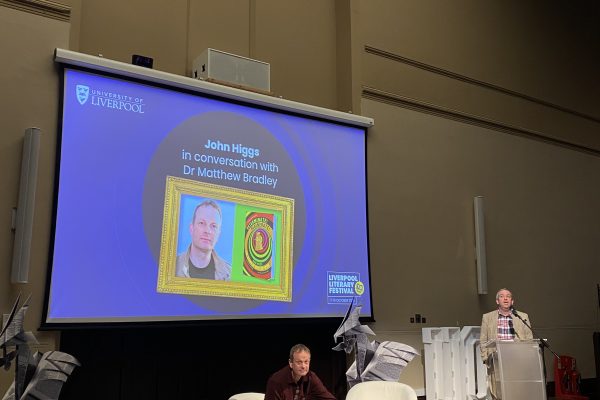6th November 2023
Listen
Listen

On the 18th of October I had the chance to hear John Higgs discuss his new book: ‘Exterminate/Regenerate: The Story of Doctor Who’, a topic that is dear to my heart.
Higgs is an author known for his work in biographies and history books; his last release in 2022 traced the overlap between the James Bond series and The Beatles. For this talk he was joined by Dr Matthew Bradley, professor of English at the University of Liverpool who, although specialising in Victorian literature and culture, expressed a lot of love for Doctor Who!
Higgs takes an intriguing stance on the popular British show, not giving us a chronological retelling of the timelord’s travels as we might expect, but instead discussing the show’s place in British culture. Bradley and Higgs begun the talk noting that Doctor Who may be the most documented and extensive show in history, and is one entirely crucial to British culture. Certainly, Doctor Who is a culture in itself, and one that transcends generations – my parents told stories of hiding from Daleks behind the sofa, and I have done the same!
Recounting his time working with Tom Baker, Higgs jokes that:
He recalls being in a pub with the former timelord, watching a fan’s face in awe across the room as he noticed who was sitting mere metres away. This struck Higgs, realising that Doctor Who is a ‘very special thing’, to which Bradley agrees that the former actors of the eponymous character carry ‘a kind of immortality’.
Doctor Who is unique in many ways, not only in its raw power to impact culture, but in its form too. The two discuss how unlike many popular franchises, Doctor Who lacks one singular creator and is instead formed from ‘forces rather than people’ (Bradley). It is constantly changing, and it is fuelled by fans. This last point rang particularly true for me. As a member of the Doctor Who Society at the University of Liverpool, every week I see the impact the show has on fans, but also the impact that fans have on the show. Between fan-films, radio shows, and short stories, fans keep Doctor Who alive just as much as it sustains them.
Lastly, Higgs ponders why Doctor Who has never really found its place abroad, settling on the conclusion that:
Overall, the talk was wonderful to attend, and I left with a feeling of childhood whimsy that only Doctor Who seems to achieve. I highly recommended picking up a copy of Higgs’ new book, fan of all things timey-wimey or not!
To read our other reviews of the Liverpool Literary Festival, please click here:
https://www.liverpoolguildstudentmedia.co.uk/category/arts-culture